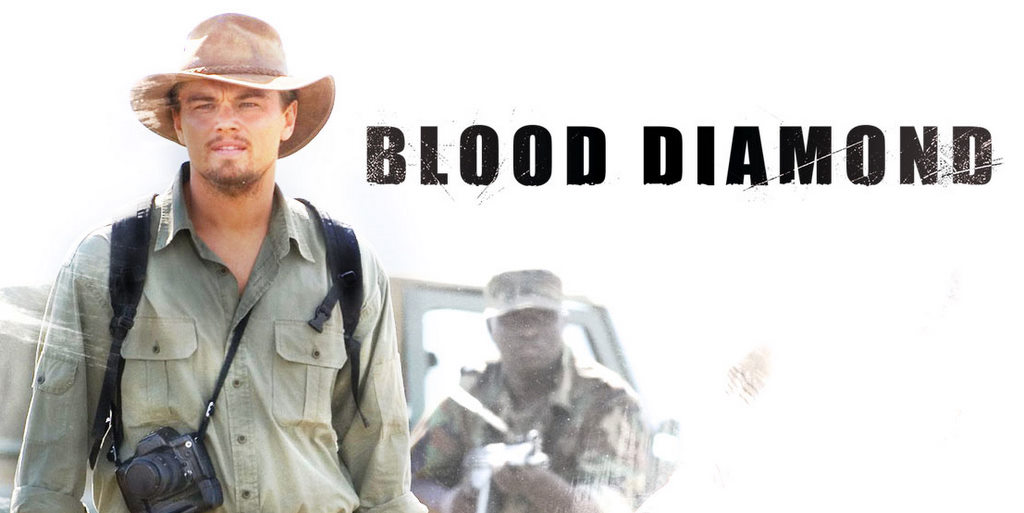
June 26, 2012, by ICCSR
Conflict Diamonds: A Hollywood Ending?
On a particularly rainy day I found myself re-watching Blood Diamond, the Hollywood blockbuster starring Leonardo DiCaprio and Djimon Hounsou. It tracks the fate of a prisoner of war (Hounsou) who is separated from his family during the civil war in Sierra Leone. His path crosses with diamond smuggler DiCaprio, and they both end up fighting to find both a gigantic diamond, and Hounsou’s son, who has been taken as a child solider. The film reflects that fact that diamonds were often mined and traded illegally with foreign multinationals, who in turn funded the continuation of horrific civil wars, in both Sierra Leone and Liberia. Recently ex-Liberian Prime Minister Charles Taylor was found guilty of perpetrating these wars for his own gain.
Since the film is a Hollywood blockbuster (car chases, explosions and romance all feature) the danger was that hard-hitting topic would not be given justice. Blood Diamond, however, manages to be both entertaining and educational. One thing that it doesn’t get right, however, is the ‘happy-ever-after’ scenario it leaves us with, and this is something worth reflecting on in terms of CSR.
In the film, media reports, and DiCaprio’s salubrious contacts, expose the ‘evil’ diamond trade for all to read about, and denounce. Consumers are horrified that their engagement rings have come from war zones. The resulting symposium mirrors the real-life introduction of the ‘Kimberley Process’- a certification scheme that guarantees that diamonds are legally traded from non-conflict zones. It requires input from national governments as well as multinationals dealing in precious stones, advised by a number of non-governmental organisations. So far, so good. But what seemed like a textbook multi-stakeholder initiative has largely failed to do its job.
In December last year a key advisor to the process, Global Witness, decided to publically pull their support. “Nearly nine years after the Kimberley Process was launched, the sad truth is that most consumers still cannot be sure where their diamonds come from, nor whether they are financing armed violence or abusive regimes,” Global Witness explained. They went on to detail failures in the Ivory Coast, Venezuela and Zimbabwe. The Kimberley Process, they argued, had “become an accomplice to diamond laundering – whereby dirty diamonds are mixed in with clean gems.” Corrupt governments and easily-led corporations were both pointed at for the failure of the scheme. At the heart of the matter is that violations of the initiative are not punished: voluntary initiatives seem toothless in light of the overwhelming desire for profit. What’s more, it shows that the issues of war, corruption, CSR and governance are very much interlinked- and with a very human cost when we fail to get it right.
So how would a follow up of Blood Diamond look ten years on? Sierra Leone is a country brought to its knees by a long, violent war. It is now slowly recovering, and people have great pride in the giant strides taken to recover after the ordeal. Recently Israeli mining companies have begun to mine diamonds, legally, from the area, boosting the economy and driving further investment. Elsewhere, however, Diamond smugglers still feature in many other countries around the world, with a litany of conflicts being spun out by illegal trading in weapons, diamonds and other minerals, such as those used in electronics. Business has a great burden of responsibility here, but as students and practioners of CSR know, the complexity of the supply chain often makes tracing conflict resources difficult. A certification process might have worked, and may well do so in the future, given sufficient support from governments and industry, but at the moment it seems the price of diamonds is too tempting for many to resist. Not so much the Hollywood ending we would like to see.
More on Global Witness and Conflict Diamonds can be found here: http://www.globalwitness.org/conflict-diamonds
By Lauren McCarthy. Lauren is Graduate Teaching Assistant at the ICCSR, Nottingham University Business School.
No comments yet, fill out a comment to be the first

Leave a Reply